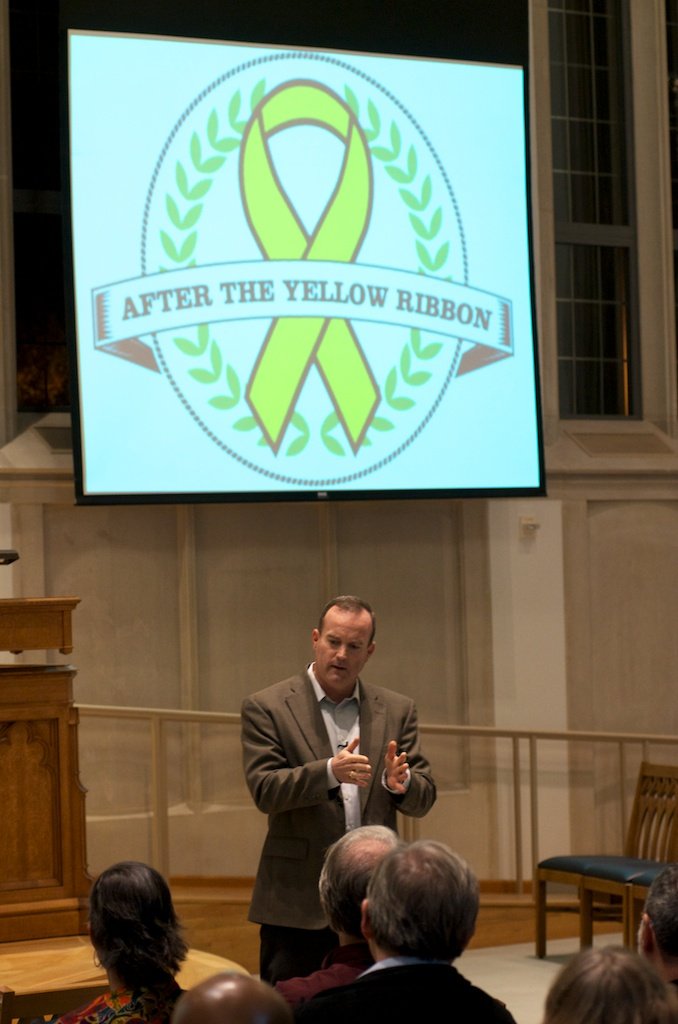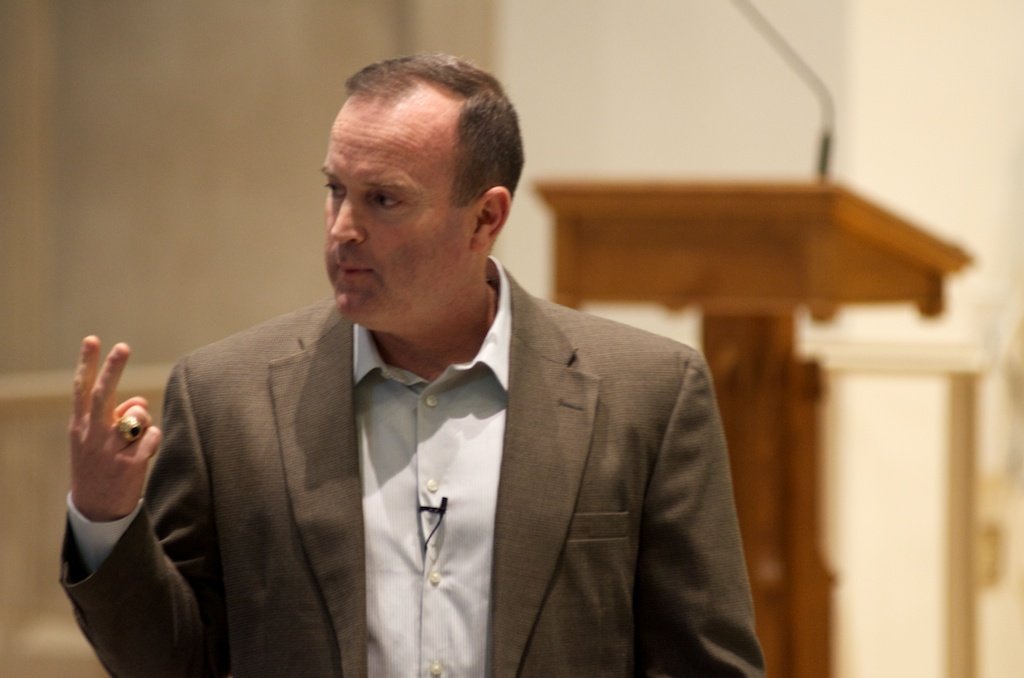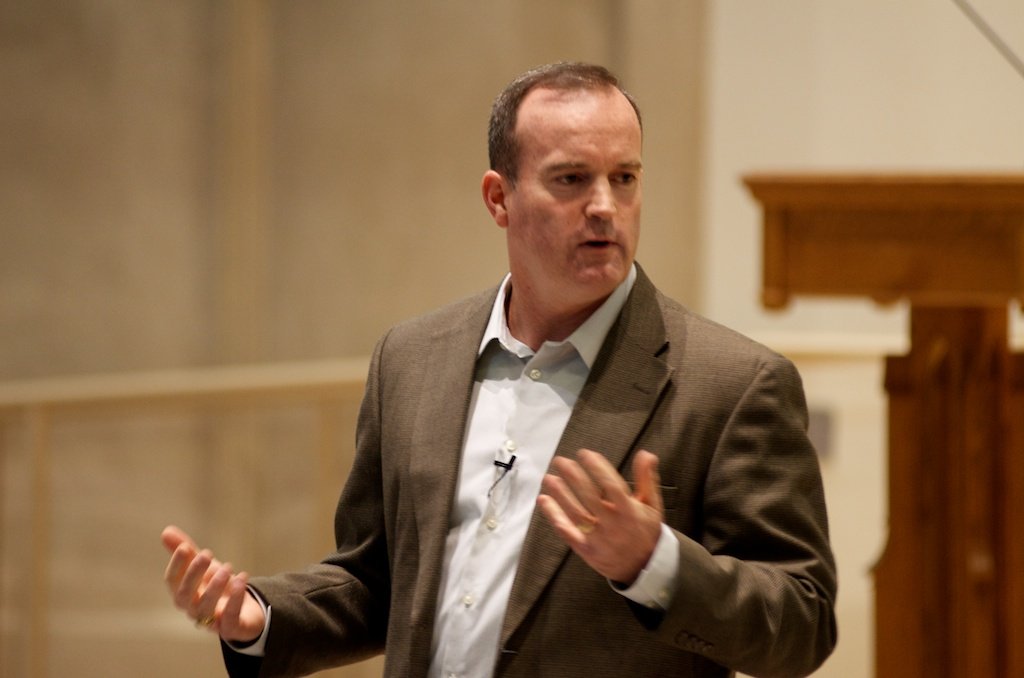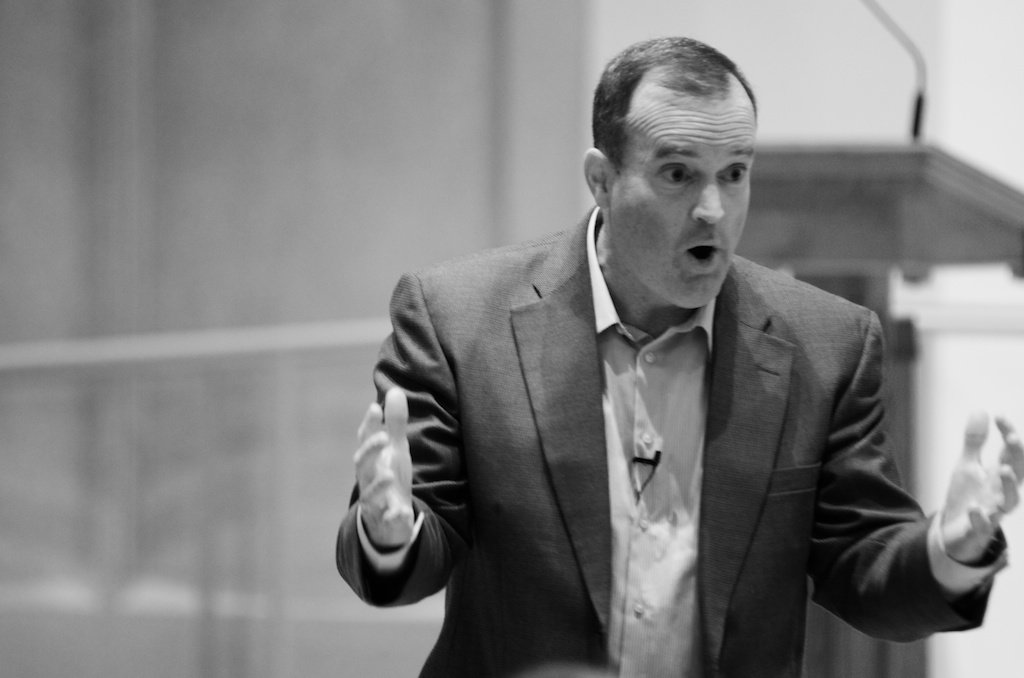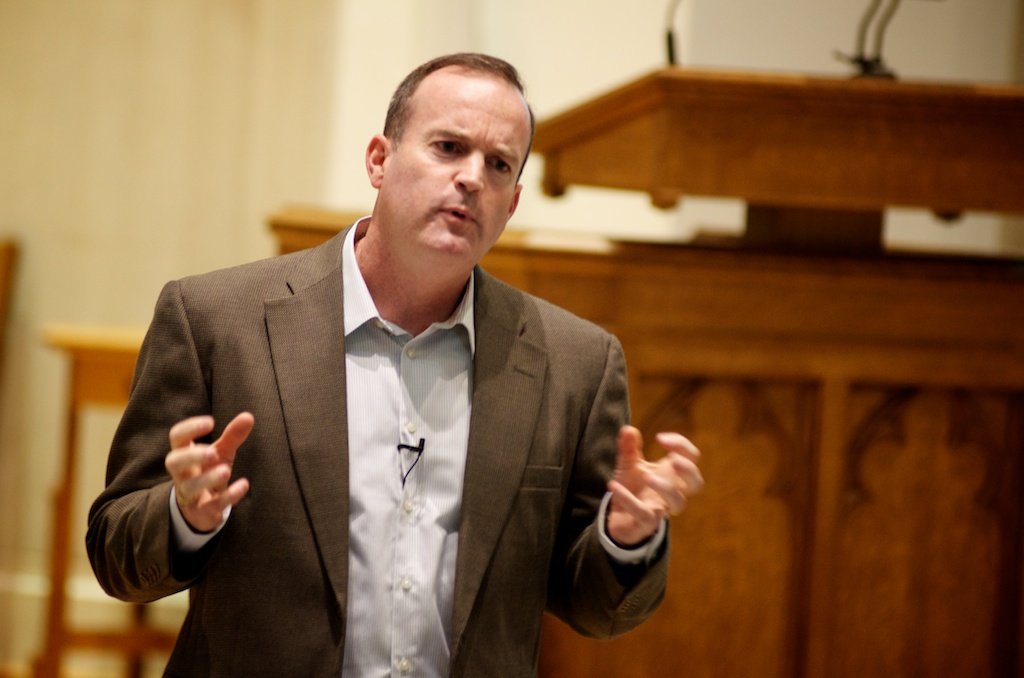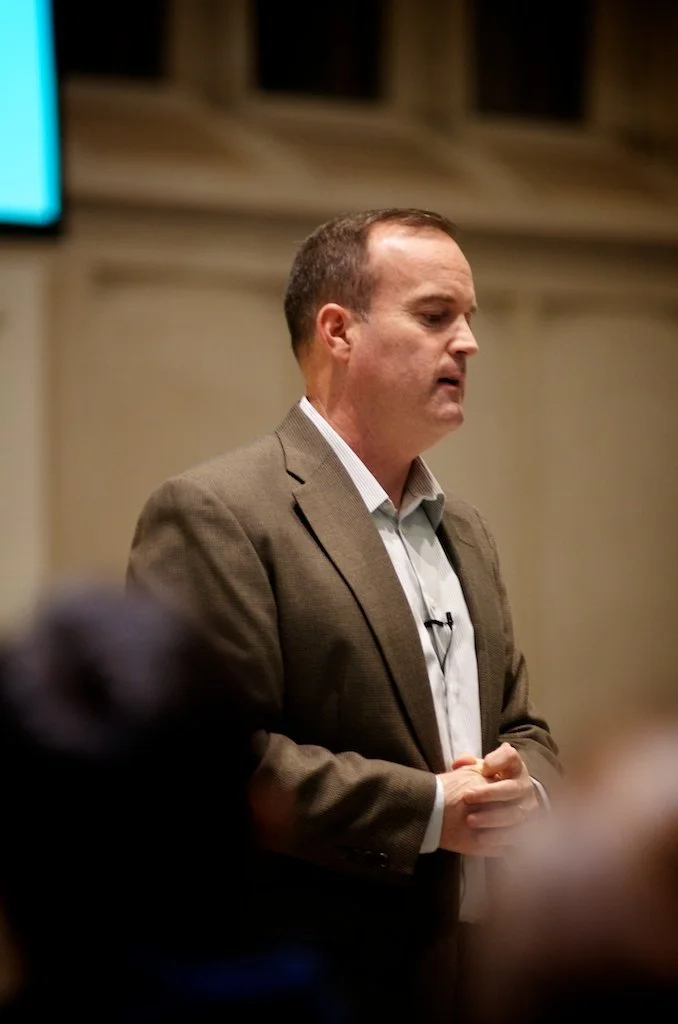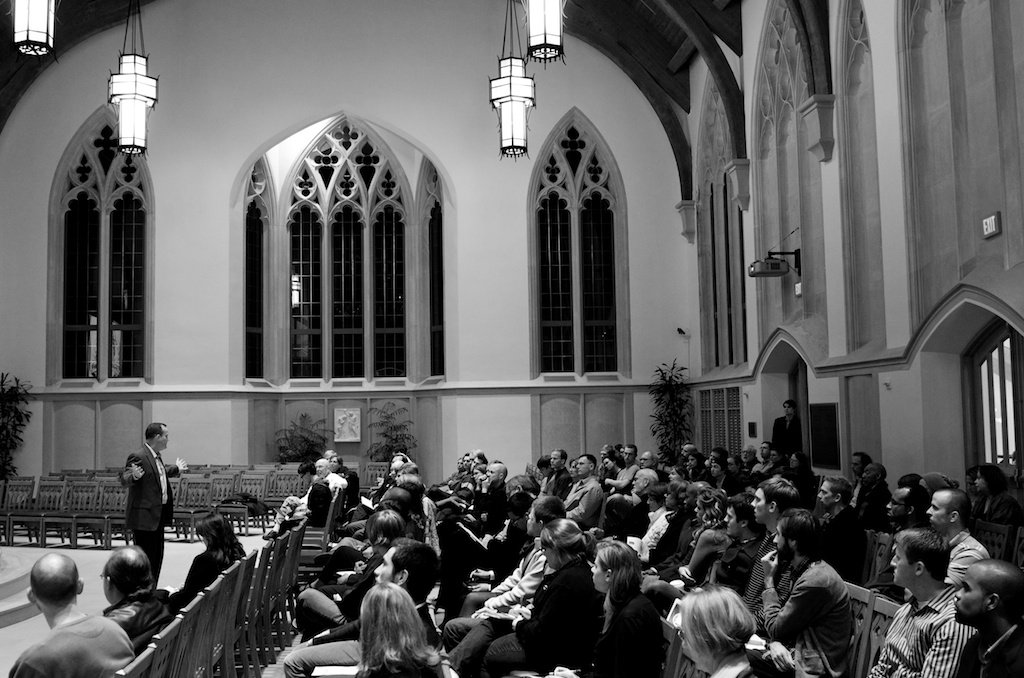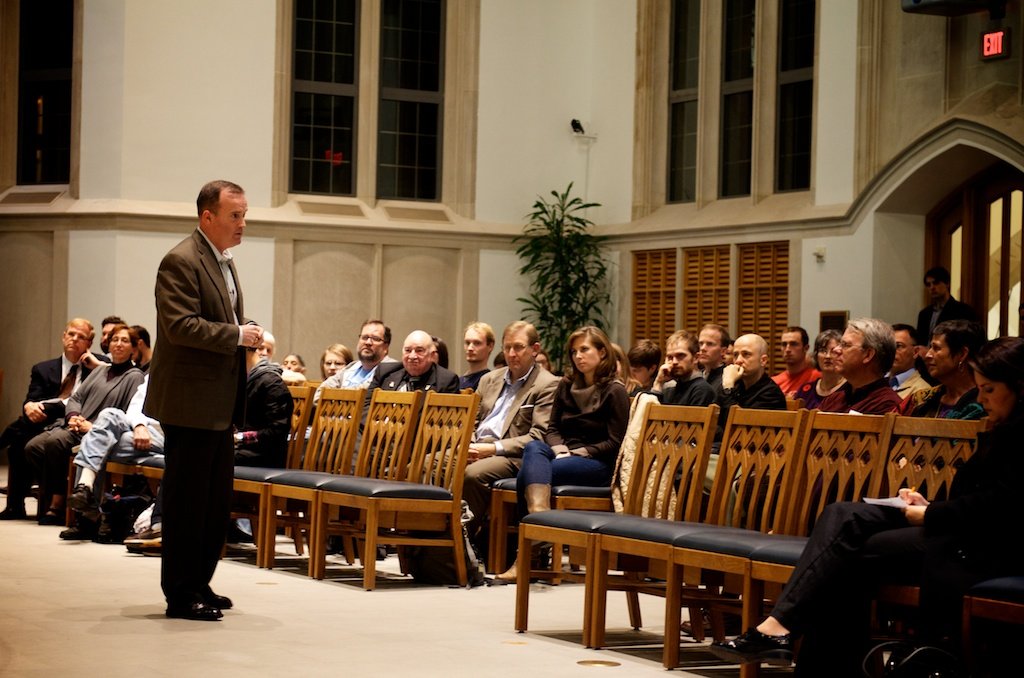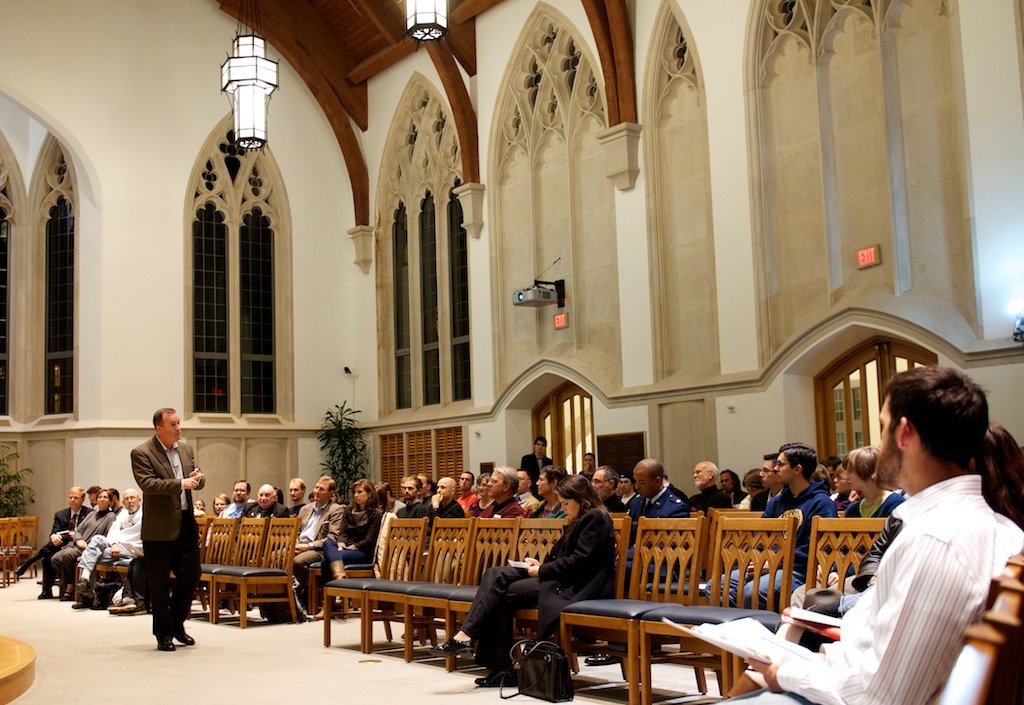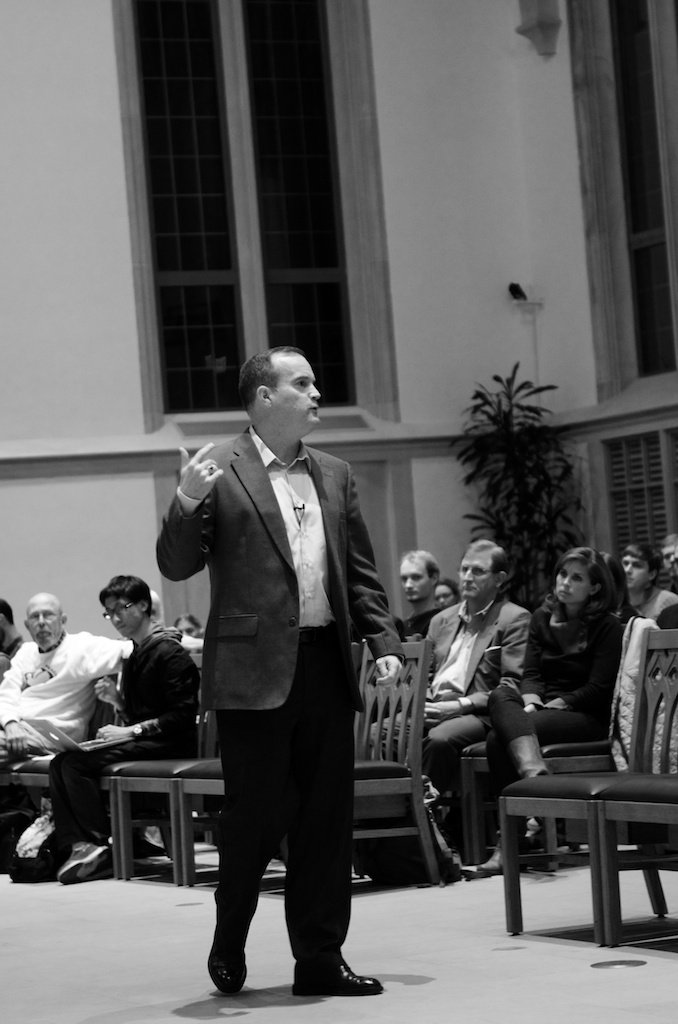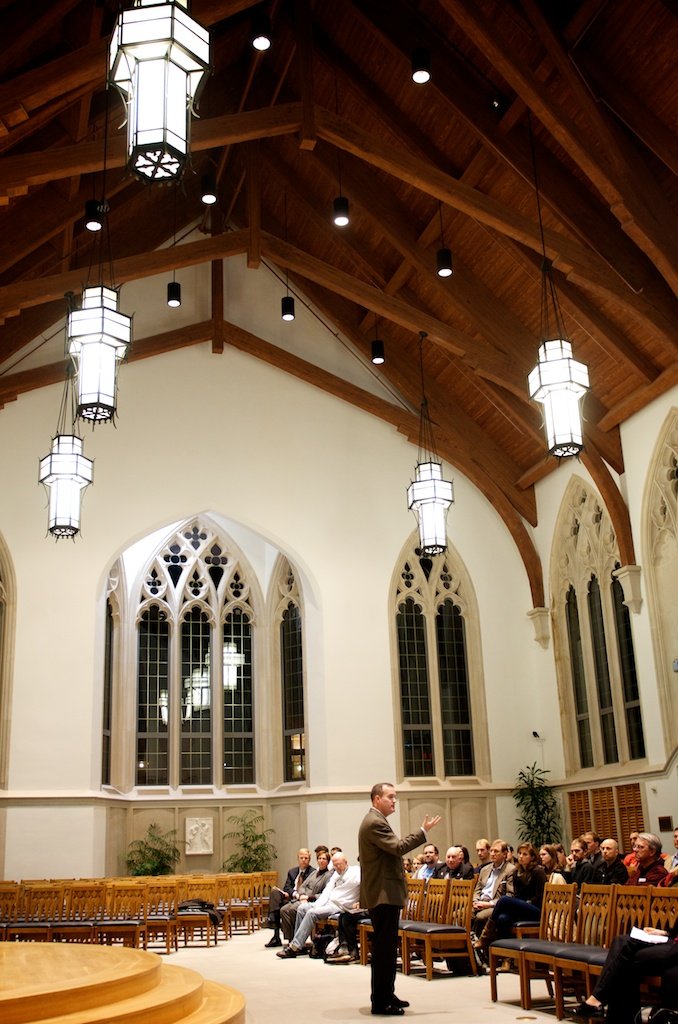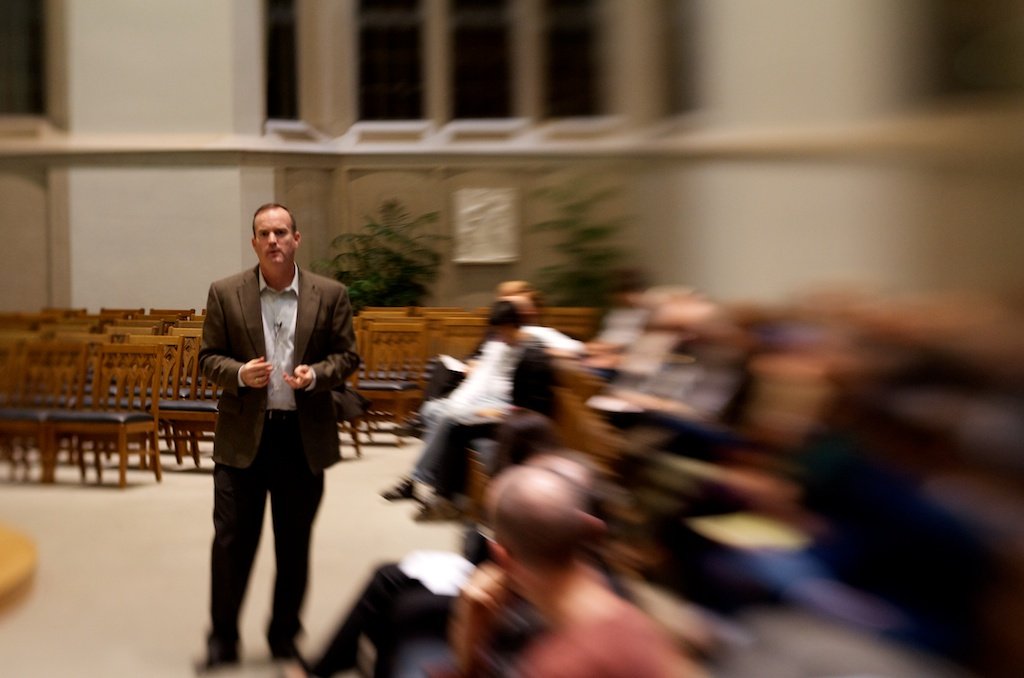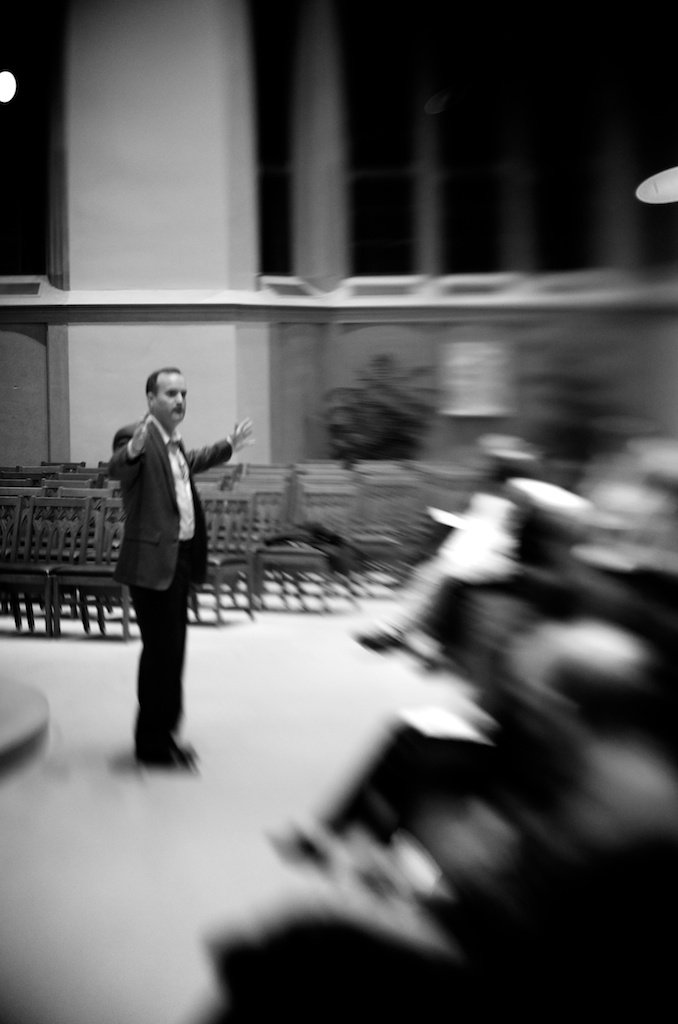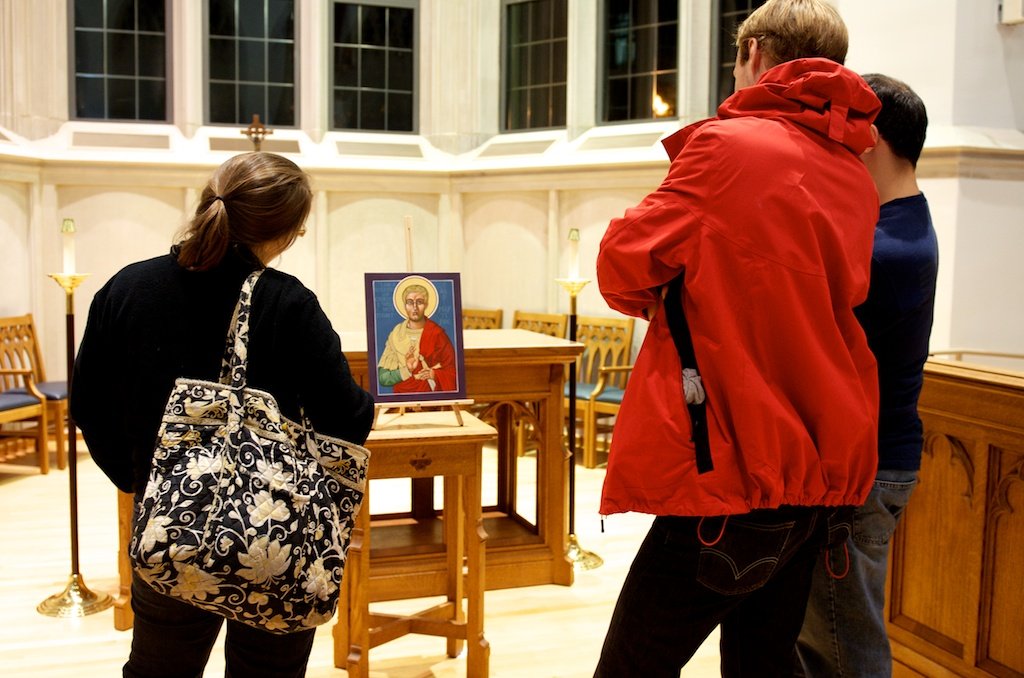After the Yellow Ribbon Keynote
“The Beauty and Tragedy of a Combat Deployment” by LTC Pete Kilner was the keynote for the 2011 After the Yellow Ribbon conference at Duke University.
Prepared Remarks
No [kidding], there I was. On September 19th, 1994, at Pope Air Force Base, North Carolina, I was a young Army infantry captain, sitting shoulder to shoulder with other paratroopers in the fuselage of a C141 aircraft, waiting to be flown into war. We were all dressed for combat, carrying two basic loads of ammunition. That night, in support of a United Nations Security Council resolution, the United States was going to drop about 14,000 paratroopers over Haiti and take down a military junta that had illegally seized power from a democratically elected government. We’d been rehearsing for about a month. My battalion’s job was to conduct an airborne assault to seize Port au Prince International Airport. I was one of the planners of the operation. We’d calculated that we would kill approximately 200 Haitian security forces on the airfield, and maybe suffer up to 20 casualties ourselves. The planning had included where we were going to put the bodies.
So, we’re sitting on the aircraft, getting ready to take off, when a soldier calls out to a chaplain who is seated near me. Over the din of the engines, I heard the soldier ask, “Chaplain, we’re going to kill all these people tonight. Is that right?” It struck me immediately that that question hadn’t ever occurred to me, even though I’d been an enlisted infantryman and an infantry officer for my entire adult life, almost a decade. And I wasn’t the only one caught off guard—everyone there seemed to stop and look to the chaplain, awaiting an answer. The chaplain responded, “You’re a soldier. The president told you to do it. That makes it right.” I felt a sense of disappointment in that explanation, and I think that others did, too. As it turned out, CNN was reporting live on the imminent invasion, so the junta surrendered and we didn’t need to conduct a combat parachute jump, and the event has largely been forgotten by history.
But the essence of that soldier’s question, “Is it morally right to kill enemy soldiers in war?” stuck with me, so a couple years later when West Point called and asked if I wanted to attend graduate school and study philosophy, I immediately accepted. I thought, “I’ve been so busy training soldiers how to kill in war that I haven’t had time to look up a good answer about why it’s right for them to kill in war.” When I got to graduate school, I looked for the answer, and I didn't find one. I discovered that the Army did not provide an answer to why it is morally right to kill in war; nor did the Department of Defense; nor did international law. I’m Catholic, and the Catholic Church has a systematic moral philosophy that provides an answer to almost every moral question—yet nowhere does the Church explain to a soldier why it would be right for him to look through his rifle sights and kill another human being. I realized that Just War Theory, or the Just War Tradition, justifies wars between nations. Just War Theory focuses on justifying war, and since war necessarily involves killing, then it implicitly follows that killing in war must be justified. But those arguments weren’t made.
I wanted an argument that explained why it would have been ok, on that night in Haiti, to kill people with my rifle. This was important to me because that night I was going to be among the last paratroopers to exit my aircraft, so I wasn't expected to land within the boundaries of the airport. I was going to land somewhere between the airport and the city of Port au Prince, perhaps in the slum outskirts of the city. I’d rehearsed many times what I would do. Upon landing, I would take my rifle out from its protective bag, place an ammunition magazine into it so it would be ready to fire, affix night-vision goggles over my eyes, remove my parachute, and begin running back towards the airport and friendly lines, shooting anyone who didn’t have infrared “glint” tape on his clothes. The uniform of all friendly forces that night included glint tape, which is reflective when viewed by night-vision goggles.
But now that I was looking for a moral justification for looking down my sights and shooting enemy soldiers in war, I kept finding pacifist arguments. Pacifists argue that since soldiers in war didn’t start the wars themselves and are forced or coerced into participating, they are in fact “innocent attackers”—they are not morally responsible for the threats they pose. So, the argument goes, since soldiers in wars are innocent of the war, and since it’s morally wrong to kill innocent people, and since you can’t have war without killing, then war must be morally wrong.
In short, I found war to have a top-down justification and a bottom-up condemnation. I was looking for a bottom-up justification.
“Making Sense of a Combat Deployment”
A combat deployment can be a beautiful experience. It may be shocking to hear those words--heck, I feel uncomfortable speaking them--because we all know that “war is hell,” which it indeed is. What is less known, however, is that war is also characterized by beautiful glimpses into heaven that we won’t find anywhere else, experiences that civilians may be unaware of and that combat veterans often feel uncomfortable acknowledging. Combat veterans understand and despise the tragedy of war in a deeply personal way, but they also fondly remember and frequently long for the beauty they experienced downrange. So, as we reflect on our own combat deployments or try to help others make sense of their deployments, we would do well to recognize that war isn’t an “either-or”--a good or bad memory; rather, war is a “both-and”-- characterized by intense, intermingled beauty and tragedy.
How is war beautiful? “War is,” as Chris Hedges put it, “a force that gives us meaning.” We fight wars for great causes--to protect the innocent, to defend the Constitution, to preserve freedom, to make the world a better place! We willingly put our lives at risk to fight for cause bigger than ourselves. And on a combat deployment, everyone to our left and our right--everyone we work and live with, 24 hours a day, seven days a week, for months on end--is living out the same commitment; all are willing to die for something greater than self. It’s inspiring, and it’s beautiful to be a part of. On a combat deployment, we learn the sublime joy of experiencing shared purpose, shared dedication, and shared sacrifice. We and our brothers and sisters there on a deployment would literally die for each other. Those aren’t merely aspirational words; we actually witness soldiers risking their lives and sometimes giving their lives for their fellow soldiers or for civilians, and we know that we would do the same for them. As close as we might be to our family and friends back home, we doubt whether they would sacrifice their lives for us. Yet, on a deployment, people who would give their lives for us, not necessarily because we are friends, but because we share the same commitment to the same great purpose, surround us. The bond that unites those who are putting their lives on the line for something greater than themselves and who are sacrificing and struggling together to do their parts to achieve that great purpose, is a love unlike anything experienced outside of the context of war, at least for most people.
I’ve had the privilege to interview nearly 400 American soldiers during their deployments in Iraq and Afghanistan between 2003-2011. The stories I heard and the actions I saw testify to the bond of love among soldiers. One instance was an infantry platoon on a remote outpost in Afghanistan in 2006. The platoon was isolated; the enemy had emplaced belts of IEDs along the few mountain roads that led to the platoon’s location, so it would take days for friendly forces to clear the bombs and reinforce the platoon. That platoon of around 25 soldiers came under attack from a force of 300-400 Taliban. Intercepted radio communications revealed that the attackers, led by well-trained foreign fighters, planned to overrun the outpost and videotape their mutilations of the Americans’ bodies. The attackers’ overwhelming fires soon destroyed the platoon’s only mortar tube and damaged all five of the platoon’s HMMWV trucks, on which were mounted the platoon’s only heavy weapons--.50 caliber machine guns and 40mm grenade launchers. All five HMMWVs caught on fire after being damaged by enemy fire, so the soldiers had to remove all the ammunition from them. The situation was desperate; the soldiers had to keep the attackers far enough away so that Air Force aircraft could engage them with bombs. What did the soldiers do? They continued to fight from the burning HMMWVs. One at a time, a soldier carrying a box of ammunition would rush through a hail of Taliban gunfire to a HMMWV, load its weapon system, and surrounded by flames and facing relentless incoming enemy fire, he would fire the weapon at the approaching enemy until the ammunition was expended. By this time, the soldier’s fire-resistant uniform would usually be smoking and the flames would singe his skin. As the soldier sprinted away from the HMMWV to the relative safety of a rock overhang, he would cross paths with the next soldier rushing into the flames with a fresh box of ammunition. As their HMMWVs literally burned to the ground around them, the soldiers kept fighting until overwhelming air power finally repulsed the attack. Imagine how those soldiers felt about each other.
I witnessed less dramatic but no less powerful examples of soldiers’ love for each other on a hot summer day in Iraq. I was accompanying soldiers whose mission was to clear an Iraqi neighborhood, which meant they had to inspect every room and yard of every building to insure there were no caches of weapons. Hour after hour, building after building, they inspected homes, on a day when the temperature exceeded 100 degree Fahrenheit. Twelve hours after it commenced, the day’s mission was drawing to a close, and the tired, sweaty squad of soldiers I was with returned to their Stryker combat vehicle. Inside the vehicle was a cooler filled with cold drinks. I couldn’t wait for the cold liquid to quench my thirst. As we down on the bench seats inside the Stryker, the soldier closest to the cooler opened it and began handing bottles to his comrades. He didn’t first take a quick drink; he didn’t have everyone reach into the cooler on their own; he passed drinks around to everyone, and then they all drank at once. Another soldier pulled out an energy bar. He asked who else wanted some. When two soldiers say they did, he ripped the bar into three equal pieces and shared them. A few minutes later, as the vehicle drove down a road, it suddenly changed speeds and one soldier, the “air guard” who was standing on the bench to observe outside the vehicle and provide security for everyone sitting inside, lost his balance. His boot stomped into the crotch of one of the soldiers seated below him. It hurt me to witness it. What happened next? The air guard immediately apologized, and the stomped-upon soldier, who was obviously still in pain, replied “No problem, man.” The absolute absence of any anger or resentment in the victim’s response was remarkable. It indicated to me that he trusted and assumed the best of the soldier who had caused him considerable pain. The sharing of the water bottles and the energy bar and the quick forgiveness of a hurt were unremarkable to the soldiers that day; they thought nothing of it. Six months into a combat deployment, that’s just how they were. As an outsider, however, I noticed that they were living in a culture of love and acceptance that one rarely finds in life outside of war. Many soldiers over the years have confided to me that the love they had with their teammates during a deployment was deeper than the love they have even with their families.
We’ve seen how deployments enable us to commit our entire lives to great and importance causes, and how they foster deep bonds of love with our fellow soldiers. A third beautiful aspect of a combat deployment is the positive impact it has on our relationship with God. It’s cliché to say “there are no atheists in a foxhole,” but it’s undeniably true that the fear and uncertainty of war turn many soldiers’ hearts to prayer. Modern-day Americans may feel little need for God in their everyday lives. Few are farmers, so they don’t need to pray about the weather. Most enjoy great medical care, so we rarely have need to pray about our health. Most of us live in very safe neighborhoods and trust our neighbors and the police. Often, it takes a personal crisis to put us down on our knees. But life on a combat deployment is different. While deployed, we are caught up in circumstances we cannot control and face people who are actively trying to kill us, so we turn to God for assurance. I consider myself a fairly prayerful person; I participate in liturgical worship every Sunday and lead a men’s prayer group that meets weekly, but I know that I’ve never prayed continuously--almost as a way of being--except during my five deployments and two stints at Ranger School.
If you believe, as I do, that a meaningful life consists of loving God and neighbor and of using our God-given talents and skills to make the world a better place, then we should not be surprised that a combat deployment can be a beautiful experience for its participants. On deployment, we turn to God to meet our deepest needs, we experience “no greater love” with our brothers and sisters in arms, and we give ourselves totally to protect the lives of others.
What’s not to love about a deployment? A lot. While war often brings out beauty, it is always a tragedy. Even when waged for a just cause, war violates our sense of justice. Good people kill and are killed. Innocent civilians suffer. Property is destroyed. Public resources are devoted to destruction, not construction.
The fundamental tragedy of war is that we have to kill other human beings. We do it to protect innocent lives, but we cannot escape the reality that many of the enemy soldiers we kill are innocent in some respects. War rarely pits the good guys in the white hats against evildoers in black hats.
One Army officer told me that he’d killed seven enemy over the course of the war, six of them legally. He explained that he continued to feel sadness over the six legal kills, but no guilt at all about illegally and secretly executing a detainee. Among the six “legal” kills were a 53-year-old man who, because he was a Sunni Muslim in an area that Sunnis had taken control of, couldn’t get a job, so he was emplacing an IED to make $50 to feed his family. Another insurgent this officer killed was a young teen that had been raised in a foreign madrassa and who thought he was doing the will of God to attack “infidel” American forces. The officer felt bad because those insurgents had been coerced or misled in becoming enemy fighters, even though his decision to kill them was fully justified by the laws of land warfare and just war theory. On the other hand, the officer felt good about executing the al-Qaeda in Iraq leader, even though that action could have landed him in prison for the rest of his life. Why? Because he deemed the AQI leader to be “a bad man who had done terrible deeds and would continue to kill innocent people” if he were (per the law) handed over to the corrupt host-nation security forces, whom the officer knew would set the man free for a bribe. So, we see that a combat deployment creates conditions where we are supposed to kill the semi-innocent yet sometimes are supposed to protect the fully guilty, which is a morally troubling predicament to be in.
Having said that, it’s also true that it can be tragic to kill even a very bad guy. A soldier who had recently completed a deployment to Iraq shared this story at a chaplain-sponsored discussion about the morality of war. “In Iraq one day, my unit was assigned to protect a marketplace because there was intel that a suicide bomber would attack it. I was at my post. Based on descriptions in the intelligence, I identified the SVIED attacker as he approached. I engaged with my weapon, killing him and saving countless innocent people at the marketplace. Everyone said I did the right thing, that I was hero for saving so many lives. But ever since that day I’ve felt emptiness, a sense of sadness, deep in the pit of my stomach. Why do I feel bad about doing something that’s supposed to be right?” One chaplain there offered an interesting response.
“Do you believe in Heaven and Hell?” the chaplain asked the soldier.
“Yes,” he replied...
“Do you believe in judgment that’s based on how we live our lives here on earth?”
“Yes,” the soldier replied again.
“Well,” explained the chaplain, “that suicide-vest bomber was on his way to committing mass murder when you sent him to Judgment. It’s likely that the Evil One won a soul that day. That’s a loss for the universe--a sadness--and you are connected to it, which may be why you sense that sadness.”
Even a completely legal, morally justified act of killing in war can result in eternal sadness.
The most tragic, heartbreaking type of killing is when we kill noncombatants by mistake. One platoon of infantrymen I spent time with was haunted by a split-second decision they had to make. On a patrol in Baghdad, one of their combat vehicles had a mechanical breakdown, stopping in the middle of a major thoroughfare on a summer evening. As some soldiers worked to repair the vehicle, others set up hasty barriers and diverted traffic to prevent insurgents exploiting the breakdown to attack with a vehicle-borne IED.
